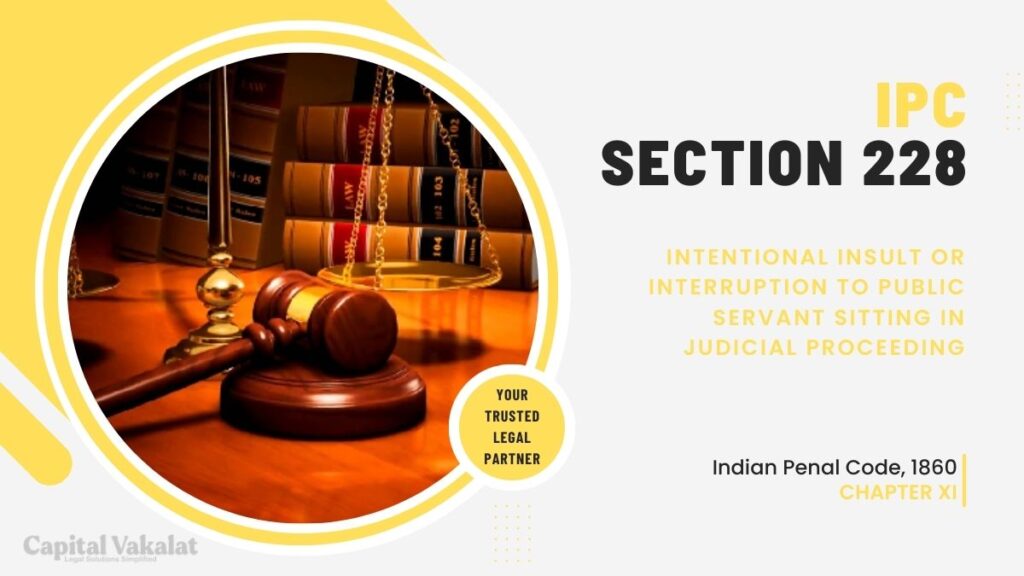In this comprehensive article, we will delve into the intricacies of Section 228 of the Indian Penal Code (IPC), which deals with intentional insult or interruption to a public servant sitting in a judicial proceeding. This legal provision plays a crucial role in maintaining the decorum and sanctity of court proceedings, ensuring the effective administration of justice.

The Indian Penal Code, a cornerstone of India’s legal framework, encompasses a wide array of provisions to safeguard the rule of law. Among these, Section 228 specifically addresses the act of intentionally insulting or interrupting a public servant while they are discharging their duties in a judicial proceeding. This article aims to provide a detailed understanding of this legal provision, its implications, and its significance in maintaining the sanctity of court proceedings.
Understanding Section 228 IPC
Section 228 of the IPC primarily deals with situations where an individual intentionally insults or interrupts a public servant during a judicial proceeding. A judicial proceeding is any legal process carried out before a court of law, including hearings, trials, and other legal actions.
This provision seeks to protect the dignity and authority of public servants while performing their duties in courtrooms. Public servants often play a critical role in the administration of justice, and any disruption or insult during their proceedings can hinder the process of justice delivery.
The Elements of Section 228 IPC
To establish an offense under Section 228, several key elements must be present:
- Intentional Act: The action must be deliberate and intentional, demonstrating a clear intent to insult or interrupt the public servant.
- Public Servant: The victim of the insult or interruption must be a public servant involved in a judicial proceeding.
- Judicial Proceeding: The act must occur during a judicial proceeding, which includes any action related to court processes.
Penalties and Punishments
Violating Section 228 IPC carries significant penalties. Upon conviction, the offender may face imprisonment of up to six months or a fine or both. It is crucial to note that the court has the discretion to decide the punishment based on the severity of the offense.
Legal Interpretations
Over the years, Indian courts have interpreted Section 228 to include a wide range of actions that can be considered insults or interruptions. The intent behind this provision is to prevent any actions that may obstruct or undermine the functioning of the judicial system.
Landmark Cases
Several landmark cases have helped shape the understanding and application of Section 228. One such case is “State of Karnataka v. Hanumantharayappa,” where the Supreme Court emphasized the importance of maintaining decorum in court proceedings.
Challenges and Controversies
The application of Section 228 has not been without controversy. Balancing the right to freedom of speech and expression with the need to uphold the integrity of judicial proceedings can be a delicate matter. There have been cases where individuals claimed that their actions were not intended as insults but rather as expressions of dissent.
Relevance and Significance
Section 228 IPC plays a crucial role in maintaining the authority and respect that public servants deserve when performing their duties. It ensures that court proceedings are conducted smoothly, without undue interruptions or insults that could compromise the administration of justice.
The Balance Between Freedom of Expression and Legal Restrictions
The provision also raises the question of striking a balance between the right to freedom of expression and the need for legal restrictions to maintain order in court. Courts must carefully consider the intent and impact of actions when determining whether an offense under Section 228 has occurred.
Conclusion
In conclusion, Section 228 IPC serves as a fundamental element in upholding the sanctity of court proceedings by deterring intentional insults and interruptions to public servants. This legal provision is essential in maintaining the decorum and respect that judicial proceedings require for the effective administration of justice.
Frequently Asked Questions
What constitutes an “intentional insult” under Section 228 IPC?
An intentional insult involves a deliberate act that demonstrates a clear intent to demean, offend, or undermine the authority of the public servant in a judicial proceeding.
Can legitimate criticism of a public servant’s actions be considered an offense under Section 228 IPC?
Legitimate criticism is generally not considered an offense under this provision. However, the court must assess the intent and impact of the criticism to determine if it crosses the line into intentional insult.
What is the significance of Section 228 in the broader context of Indian criminal law?
Section 228 IPC is vital in upholding the rule of law and ensuring that court proceedings are conducted smoothly. It contributes to the effective administration of justice.
Are there any proposed amendments or changes to Section 228 IPC in recent legal discussions?
As of my last knowledge update in January 2022, there were no significant proposed amendments to Section 228 IPC. Legal changes may have occurred since then, so it’s essential to stay updated on current legal developments.